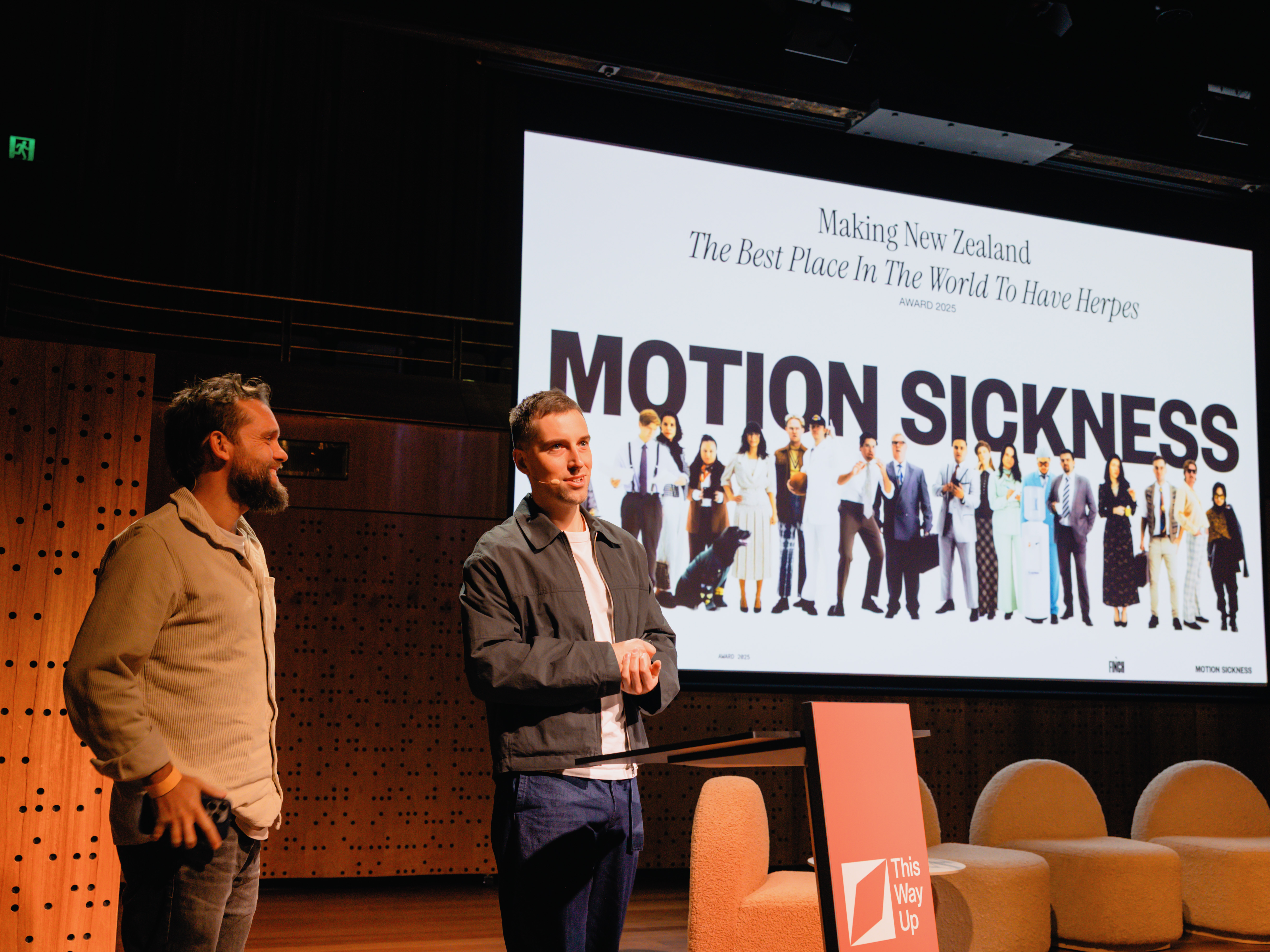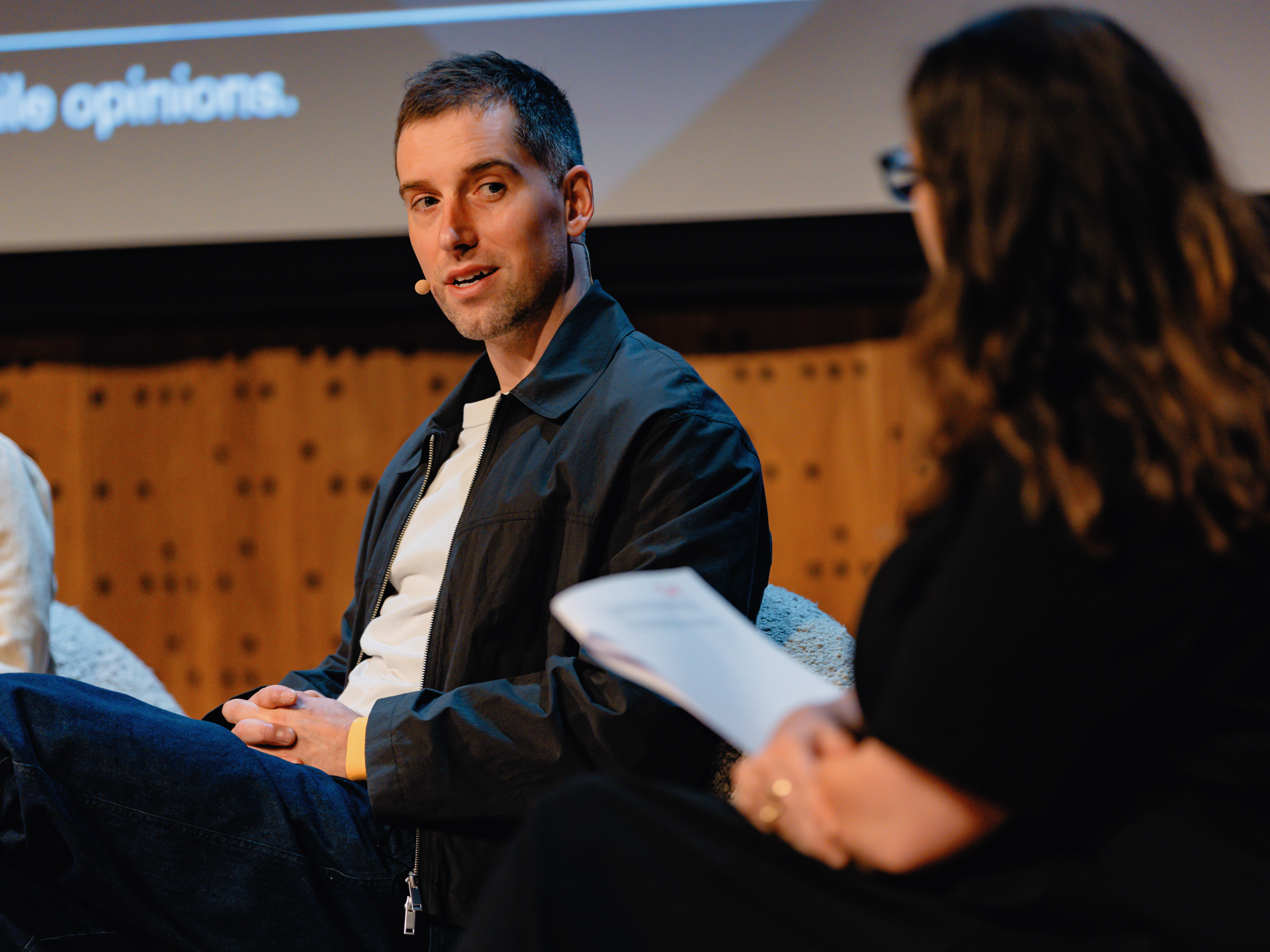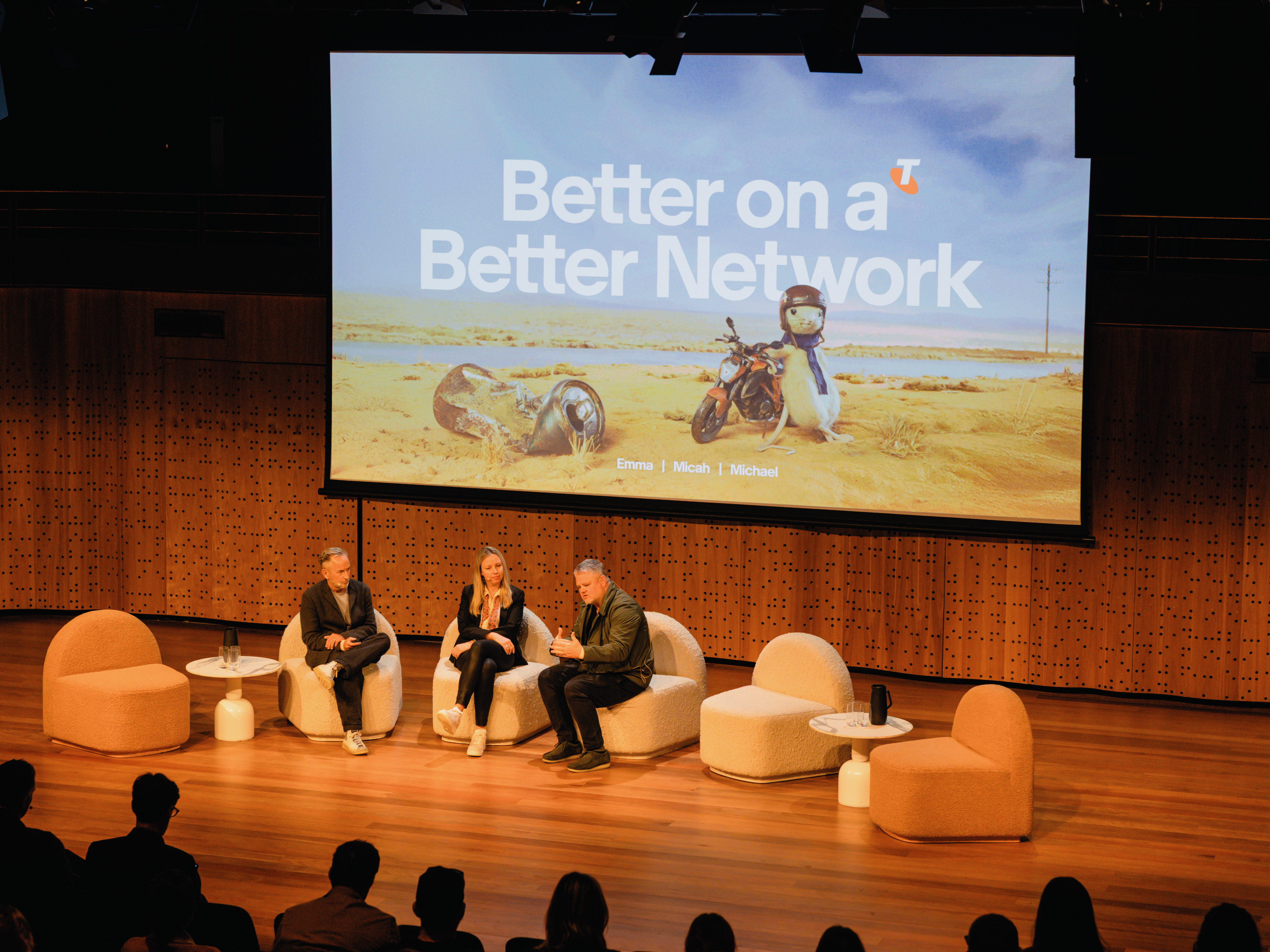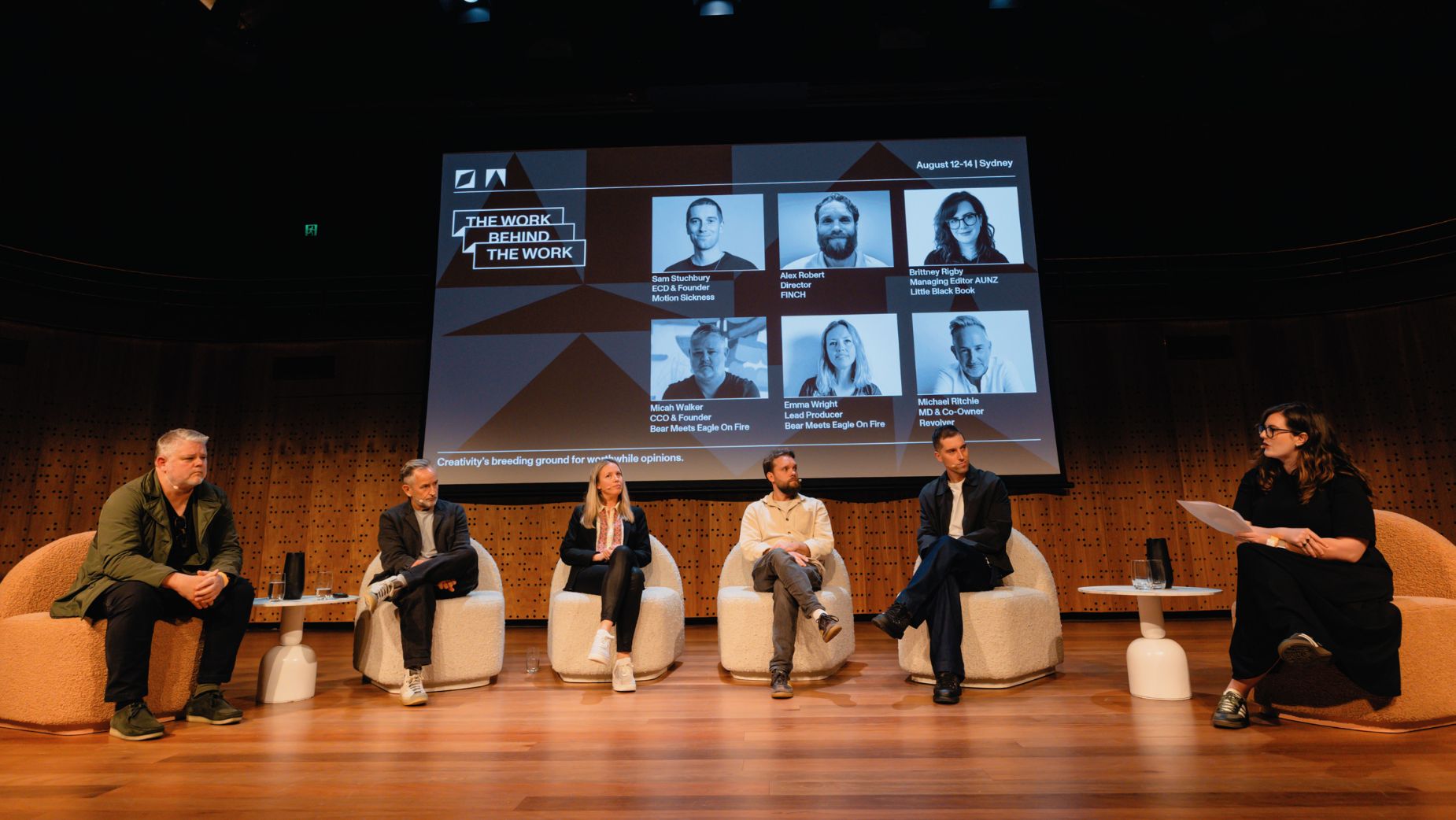Content warning: This story contains reference to suicide.
The makers of Australia and New Zealand’s most globally-lauded campaigns didn’t expect them to make sense internationally, let alone find acclaim, and navigated “full on discussions with each other” to get the work made.
Bear Meets Eagle on Fire founder and CCO Micah Walker and Revolver co-owner and MD Michael Ritchie are close collaborators on Telstra work, including the Cannes Grand Prix-winning ‘Better on a Better Network’. The ambitious, finicky, detailed stop motion project was directed by Jeff Low, and resulted in “more chats than we’ve had on anything,” Micah said.
“I don’t like hard conversations in productions, but you have to have them,” Revolver’s Michael started.
“Micah and I, we had some full on discussions with each other, because Micah was really, really going to push craft and certain things, and I’m really going to defend our director, because I know that we’re going to deliver. But we had to keep talking about it, because it was very, very difficult to know how it was going to end up.”
Revolver’s Michael Ritchie
Bear’s lead producer Emma Wright spoke to the balancing act of ensuring all 26 of the 15 second ads stood alone, while contributing to the broader collection.
She explained, “We had this chart with all of them on there, and [the creative team] were constantly [saying], ‘That one’s not as funny. We need to bring it up. We need to inject more humour into that and keep them all at the same scale.’ We really didn’t want one or two duds in the mix.”
Speaking to the friction of that process, Michael added, “As Emma said, when some of them were kind of feeling down, the creative team starts pushing them back up, and then Jeff would be pushing back, and then we’d do something different on the voice recording, and suddenly they’d pop again. It was challenging, wasn’t it? I mean, I’ve known Micah a long time, but we had to have conversations which you prefer not to have, but they actually made the job a lot better.”
Those prickly conversations were “all coming from a good place,” Micah said, because they were in service of the work.
“In the end, you have a group of people that are caring harder about something. That’s what you want. And some of the best work we’ve ever made, and certainly, this is one of those pieces, sometimes it’s quite fun, and sometimes it’s really, proper hard. As long as the goal is, ‘Are we going to make something that’s distinctive and great and something that we can be proud of?’ that stuff becomes water under the bridge.”
Micah, Michael, and Emma were speaking on a panel yesterday alongside Motion Sickness founder and ECD Sam Stuchbury and FINCH director Alex Roberts, moderated by LBB. Held at Advertising Council Australia and AWARD’s creative festival, This Way Up, it followed their consecutive Work Behind the Work sessions digging into ‘Better on a Better Network’ and ‘Make New Zealand the Best Place in the World to Have Herpes’, respectively.
At first, the two campaigns don’t appear to have much in common. One promoted Australia’s biggest telco with an array of hand-crafted stop motion animals in dozens of ads that aired during the Olympics (Emma said that media opportunity meant “everyone saw loads of them instead of just one or two”). The other was a bold bid on a small budget to transform STI stigma into national pride.
Yet both ideas were: ambitious; local in tone and context, yet acclaimed on the world stage; funny – but in awkward, culturally nuanced, and subtle ways; made by indies; and won Grand Prix at this year’s Cannes Lions.
In conversation about how the projects spoke to each other, Sam admitted he was shocked a distinctly Kiwi campaign about herpes cut through globally.
“Interestingly, we actually didn’t think it would translate well internationally,” he said in Sydney’s Australian Chamber Orchestra venue.
“We were really surprised with the international awards we got because we thought we really liked the work, but that New Zealand humour, it was so localised. People in France don’t know who Buck Shelford [former rugby union player and coach] is … I guess that that humour from the bottom of the world is hot right now.”

Alex and Sam presenting on the herpes campaign
It won two Grand Prix for Good at Cannes, and ultimately succeeded in making New Zealand the best place in the world to have herpes. But there were plenty of ways in which it could have fallen over.
Sam explained the campaign’s budget was NZD$80,000, including media spend. 30% of New Zealanders diagnosed with herpes experience depressive thoughts, and Sam revealed, “A lot of people don’t actually know that the money for this campaign got bequeathed to the foundation from someone who actually unfortunately committed suicide because of a herpes diagnosis.”
The campaign started with a series of retro and desaturated outdoor ads starring 70s and 80s stock photography, lending a texture that couldn’t be modernly recreated, Sam added, and effectively desexualising the ads. They were then accompanied by the world’s first herpes destigmatisation course, fronted by Sir Graham Henry, a former All Blacks coach, and directed by FINCH’s Alex Roberts.
The final edit included awkward pauses and off-camera glances, cutting through discomfort by creating more of it. Alex’s work with improv comedy actors trained him to “leave the camera running” long after calling ‘cut’ to capture tiny moments that became key in the final work.

“It would just be Sir Graham Henry standing there … just looking to me to see when I was going to do a cut, and that made the edit,” Alex said.
“It was really something we did find in the edit. Julian, our editor, did a great job of unearthing that. So many of the laughs we heard here were from those awkward silences.”
It was a very different process to establishing and capturing humour in the Telstra work, which features a lizard ask, “Are we cookin’?” and Tasmanian Devils larping. The 15 second scripts had to be tight and sharp.
“Once you start stop motion, it’s pretty unforgiving,” Micah noted.
“You can bring nuance to the performance, and there are little attributes that can capture that, but if it’s not funny, it’s not funny … it’s actually incredibly methodical to get to that comedy.
“You can’t wait for magic.”

Meanwhile, Motion Sickness was “writing scripts two days out and not getting any notes from the client. In a different world, we just never would have been able to make it.”
Three weeks out from filming the herpes web series, the agency didn’t have anyone locked in to front it. Sam called Sir Graham, and the knighted ex-rugby player hung up on him halfway through the call. On the shoot day, the cast arrived having not seen their scripts.
The work’s success, and award recognition, has led to new business interest and changed the shape of briefs Motion Sickness is receiving.
“Awards are great, but awards are kind of what they are, but to have that external validation, suddenly that’s put a lot of faith in some of those bigger brands.
“And the thing that’s done for our brand is the form of those briefs we’re getting. It isn’t really just asking for a campaign. It’s, ‘What is the problem we’re trying to solve, and how can we apply creativity?’, which is pretty fun.”
Alex quipped about the impact it’s had on his career, “Well, I’m known as the herpes guy. More personally for me, [it] actually probably, single-handedly, got me repped by Hungry Men in the US.”
Both said the impact it’s had on people diagnosed with herpes, and the foundation itself, is its ultimate measure of success.
Bear’s Emma recalled conversations which made her feel proudest of the Telstra project. “It was a mum on the school run, or someone in the shops, or my kids.”
Micah was with Michael in Cannes when the work won a Grand Prix (and a fistful of other Lions), and Revolver became the first Australian production company ever to win the Palme d’Or. Bear was named the third top independent agency in the world.
“A little bit personal, to be there in the moment where Michael and Revolver… I was there when he got the phone call,” Micah recalled of finding out ‘Better on a Better Network’ was a Grand Prix winner.
“That was the moment. To see how we felt, to see how much pride we felt from the hard work and [Revolver] went on to win the Palme d’Or for production company of the year. That was better than the stage for me.”
He added “the best part” was seeing his team and client so proud. The question then became, “How do we live up to a wonderful moment? We have a client that is ambitious, then we have to match that ambition by bringing work that they can be proud of.”
The success of both campaigns should make the entire Australia and New Zealand industry proud, Michael said.
“They’re awards, and I get that, but the fact is that they’re the only way that we can judge what we do, because we make this work that just goes out there in all of the various forms of media, but the way in which we can figure out where we are and how we’re doing is at those kinds of shows.
“The fact that Australia [and New Zealand] is right up there is great for everyone in this room. I think we should be proud of that and we should just keep building.”
